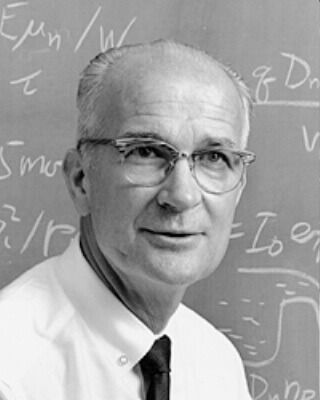
William Shockley co-invented the transistor. Shockley, along with his co-inventors, was awarded the 1956 Nobel Prize in Physics for the invention.
1. PhD From MIT
Shockley obtained his PhD from the Massachusetts Institute of Technology where he focused his research on electronic bands in sodium chloride and continued his scientific studies on electron multipliers and radar research.
2. Working With the Military
Shockley’s skills were also of interest to the armed forces. He became a research director at Columbia University’s Anti-Submarine Warfare Operations Group. He visited the Pentagon frequently, organized a bomber pilot radar training program and took tours to military bases to assess the results of that training. Perhaps his most significant involvement with the military was his research about probable casualties that would have resulted from a mainland attack on Japan. His research results directly related the decisions about the bombings of Hiroshima and Nagasaki.
3. Team Work
Shockley was working with a team of scientists to build a solid-state alternative to fragile glass vacuum tube amplifiers. The talented team of scientists worked tirelessly and had many failures before finally having a breakthrough in December of 1947. Shockley and his partners then sought a patent for their invention.
4. Breaking With the Group
Company attorneys were assigned to handle the patents for the transistor, however many technical problems were encountered and due to multiple people submitting their names for the patent, Shockley’s name was left out. Angry, Shockley broke from the group.
5. Solo Career
Working alone, Shockley was able to create a better transistor that could be a more viable commercial sale. His discoveries, the diode equation, for example, became the base on which others attempted to build their own semi-conductors.
6. Arrogant and Difficult to Work With
Shockley continued working to better his invention, was elected to the National Academy of Sciences and received many prestigious awards, the Comstock Prize among them. All of this attention was said to have gone to Shockley’s head as he became arrogant and difficult to work with. He remained in his position as a scientist rather than being promoted to an executive due to his poor leadership skills.
7. Steps of Progress Eventually, Shockley would be given a chance to prove he could be a leader when he was given a chance to run a division of a friend’s electronics firm. Unfortunately, paranoia and obsession with the technically intricate details of everything meant that steps of progress were few and far between.
8. Nobel Prize
Shockley and his colleagues were awarded the Nobel Prize in physics for their work on transistors in 1956. Although the men had not been on good terms before, they renewed their friendship and began working together again.
9. Un-skilled People
Later in life, Shockley started being very vocal about his beliefs that un-skilled people ought not to reproduce because they would increase the population of unintelligent people and lower the intelligence rate overall, thus decreasing the lifespan of the civilization as a whole. Shockley was very vocal about his disapproval of un-skilled reproduction and even published articles to that effect. He also donated his own sperm to a sperm bank in the hopes that his superior sperm would be saved, thus aiding in the prolonging of the civilization. Needless to say, his views did not gain him many friends, especially among minority groups.
10. Unfortunately, because of Shockley’s outspoken opinions, he was labeled a racist and white supremacist. The field of eugenics was overshadowed by his viewpoints and opining. Any positive light that might have been shone upon eugenics was severely hindered because of Shockley’s frankness. Unfortunately, his character flaws overshadow many of his useful contributions in the scientific field.

Leave a Reply